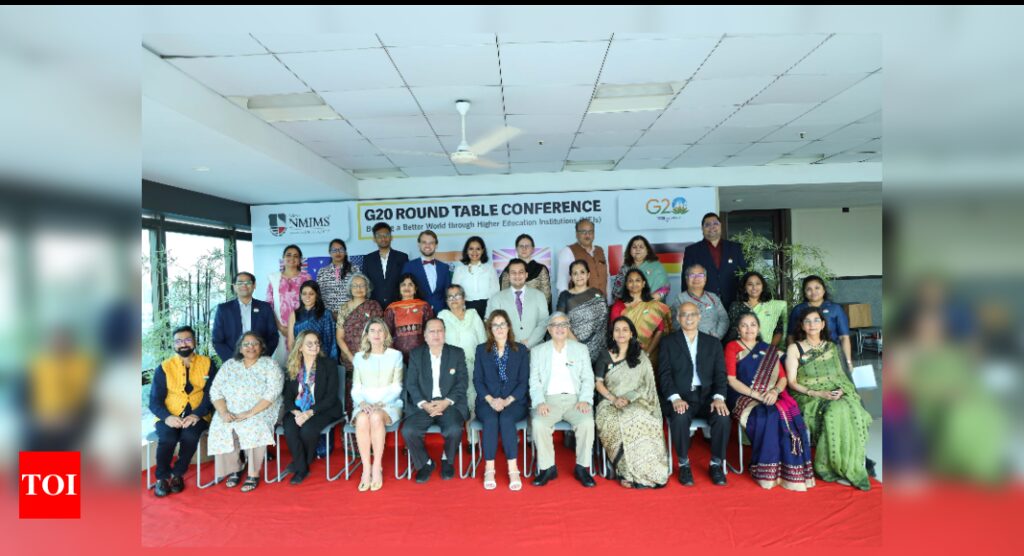NMIMS Deemed-to-be University hosted the G20 Round Table Conference, marking a milestone in promoting global collaboration of HEIs in shaping sustainable and better future.
With India leading the G20 presidency, a unique opportunity arose to convene influential voices from global education. The objective was to articulate ideas for promoting international engagement among HEIs to offer quality education, reducing global disparities and equipping students to address global challenges for creating sustainable world.
This initiative preceded the September G20 summit, setting the stage for meaningful discussions. The conference connected with education-contributing countries like Australia, the UK, Canada, Germany, and the USA. The core aim was to explore international collaborations to facilitate exchange of ideas and best practices in building capacities of HEIs in promoting quality of education, equipping students with knowledge and skills to promote employability and create sustainable future.
Eminent global figures attended, including Dr. Joanna Newman, Chief Executive & Secretary-General of ACU, as Chief Guest. Dr. Monica Kennedy, Senior Trade & Investment Commissioner -Mumbai, India- Austrade, Dr. Prachi Kaul, Director, Shastri Indo Canadian Institute (SICI), Mrs. Marja-Sirkka Einig, Deputy Consul General, Federal Republic of Germany in Mumbai, Ms. Sita Raiter, Public Diplomacy Officer, U.S. Consulate General, Mumbai, Dr. Ryan Pereira, Regional Officer, United States-India Educational Foundation and Ms. Rittika Chanda Parruck, Director- Education, British Council enriched the dialogue. Notably, guests from various G20 countries reinforced its international significance.
The Commonwealth is a dynamic amalgamation of precisely 54 member states, with a substantial majority tracing their origins to territories once governed by the expansive realm of the British Empire. These member states collectively span diverse continents—Africa, the Americas, Asia, Europe, and the Pacific—forming a mosaic of diversity and culture.
The core objectives of this association embody a tapestry of ideals that bind these nations. This includes fostering mutual understanding, and constructing bridges of comprehension across divergent realities. Amid these objectives, we witness a dynamic interplay of expression styles, oscillating between contemplative elaboration and succinct conveyance.
NMIMS’s G20 Round Table working Committee, including Vice Chancellor Dr. Ramesh Bhat, Pro VC Dr. Sharad Mhaiskar, Dr. Meena Galliara, Director, Jasani Center for Social Entrepreneurship & Sustainability Management, School of Business Management, Dr. Kaiwan Mehta, Dean, Balwant Sheth School of Architecture, and Ms. Meena Saxena, Director, International Linkages, participated, alongside the Deans and Directors of all the schools.
The conference aimed to explore Higher Education Institutions (HEIs) as architects of an inclusive future to tackle global challenges like climate change, geopolitical tensions, and economic uncertainties. HEIs have the potentials to drive transformation through knowledge dissemination, research, and skill development for a sustainable world.
The conference emphasised the role of HEIs in attaining UN’s SDG 4 to ensure inclusive, equitable and affordable quality education which is crucial to attain economic prosperity and social development.
The insights drawn and the action points proposed through the deliberations of the Round Table Conference to facilitate international engagement for strengthening the collaboration of HEIs to attain SDG 4 and address global challenges will be presented to the G20 presidency, UGC and other key stakeholders. The event previews a broader assembly next year, bringing South Asian academicians to discuss advancing global higher education.
Dr. Ramesh Bhat, Vice Chancellor, SVKM’s NMIMS underscored the role of HEIs in global challenges. He said, “At the G20 Round Table Conference, the discussions revolved around topics including advancing collaboration and partnerships among global higher education institutions. Deliberations covered inclusivity in education and learning endeavours, enhancing student exchange programs for improved mobility, and making international education accessible to students both in India and abroad. The meeting encompassed a range of vital themes, all of which will be meticulously compiled into comprehensive reports, capturing valuable suggestions and recommendations and will be shared with all our stakeholders. NMIMS University is proud to host this event, and we are committed to implementing the outcomes to shape a brighter future for generations to come.”
Dr. Joanna Newman, Chief Executive & Secretary-General of ACU said, “Today, we talked about how international collaboration between universities can meet sustainable development goals. In a network like the Association of Commonwealth Universities, we have over 500 universities across 50 countries. It’s an example of how international collaboration meets global challenges. We have the climate and resilience network, peace and reconciliation network, and sustainable development goals network, and in those networks are hundreds of academics based across the commonwealth, coming at the same issue from very different contexts. When they come together, it’s the diversity of experience that makes the potency of the research collaborations work and because they come from different backgrounds, but have the same concerns, they come up with really excellent ideas about how to collaborate and solve global challenges.”
About SVKM’s NMIMS
Established in 1981, NMIMS is today recognised as a globally reputed university with strong industry linkages. It offers multiple disciplines across eight campuses that consist of 17 specialised schools, more than 25,000 full-time students, and 800+ full-time faculty members, including ten faculty members with the Fulbright and Humboldt International Scholarship for post-doctoral researchers. Shri Vile Parle Kelavani Mandal (SVKM) laid the foundation stone of this esteemed university with the aim to cater to the rising demand for management education in the country. It is known for its consistent academic quality and research-focused approach to holistic education. SVKM’s NMIMS has been granted Category-I University status by Graded Autonomy Regulation 2018 by MHRD/UGC, and NMIMS Mumbai Campus is NAAC accredited with A+ (CGPA of 3.59).
Disclaimer: Content Produced by NMIMS

